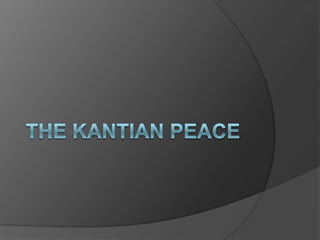Recommended
Recommended
More Related Content
What's hot
What's hot (20)
Political Science 7 – International Relations - Power Point #10

Political Science 7 – International Relations - Power Point #10
What role does liberalism play within security studies

What role does liberalism play within security studies
Political Science 5 – Western Political Thought - Power Point #10

Political Science 5 – Western Political Thought - Power Point #10
War and Peace in the 21st century, or Will the World Collapse in the Next 10-...

War and Peace in the 21st century, or Will the World Collapse in the Next 10-...
Speech by former US Secretary of State Madeleine Albright on Democracy and Se...

Speech by former US Secretary of State Madeleine Albright on Democracy and Se...
Collection of Economic Freedom Quotes (Curated by Christopher Allen)

Collection of Economic Freedom Quotes (Curated by Christopher Allen)
Political Science 7 – International Relations - Power Point #5

Political Science 7 – International Relations - Power Point #5
Similar to The democratic peace
Similar to The democratic peace (18)
Surname 1 namecourseinstitutiondatewill the spread of 

Surname 1 namecourseinstitutiondatewill the spread of
Liberalism and IRDevelopment of INR – Week 5Kant Essay o.docx

Liberalism and IRDevelopment of INR – Week 5Kant Essay o.docx
Political Science 7 – International Relations - Power Point #6

Political Science 7 – International Relations - Power Point #6
Sir221 2016 ft unit 1 - actors in ir + realism theory(1)

Sir221 2016 ft unit 1 - actors in ir + realism theory(1)
More from jsewell
More from jsewell (10)
The democratic peace
- 2. Relevancy Globalization Greater interactions Superpower status Power shape global system Theory informs policy Leaders are paying attention, so shouldn’t we then get it right?
- 3. “And now America faces a third opportunity to provide the kind of lasting peace that for so long eluded us. At this defining moment, I know where I stand. I stand for American engagement in support of a democratic peace, a peace that can secure for the next generation a world free from war, free from conflict.”—George H. W. Bush (1992)
- 4. “Ultimately, the best strategy to ensure our security and to build a durable peace is to support the advance of democracy elsewhere. Democracies don't attack each other.” –Bill Clinton (1994)
- 5. “And the reason why I'm so strong on democracy is democracies don't go to war with each other. And the reason why is the people of most societies don't like war, and they understand what war means.... I've got great faith in democracies to promote peace.” –George W. Bush (2004)
- 6. Kant’s Perpetual Peace Act “only on that maxim through which you can at the same time will that it should become a universal law.”—Immanuel Kant
- 7. Background on Kant Basis for domestic & international peace Hobbesian view of state of nature Create system with checks “Perpetual Peace”: Two Stages
- 8. Perpetual Peace: Stage One Realistic peace agreements No standing armies No excessive credit system Relevant today? Respect state sovereignty Restraints to warfare
- 9. Why “civilize” warfare? Why limits: Spies? Assassination? Torture? Treatment of prisoners? Target civilians?
- 10. Stage Two: Constitutional Republics Constitution Separation of Powers Respect for law Representative government Citizen consent caution Personal risk Personal resources National debt
- 11. Stage Two: Federation of Free States Rules of respect & cooperation Sovereignty Peace & security Transfer domestic rule of law to international level Universal norms
- 12. Stage Two: Hospitality Respect foreign visitors Greater interactions Commerce No imperialism
- 13. End Game Creates international norms Peace is in self-interest of all NOTE: not a“democratic” peace, instead institutions + liberal values
- 14. Reflection Can these traits only be found in liberal democracies? If we buy into the Kantian peace, are we then obligated to actively create more democracies for the greater good?
- 16. Other Views of Democratic Peace Satisfaction Accounts Satisfied individuals Shared interests with other democracies Constitutional Accounts Deliberation slows decision-making Open debate
- 17. More Normative Accounts Internalized norms Shared norms Elections Avoid voter backlash Interdependence Greater trade (self interest) Greater interaction
